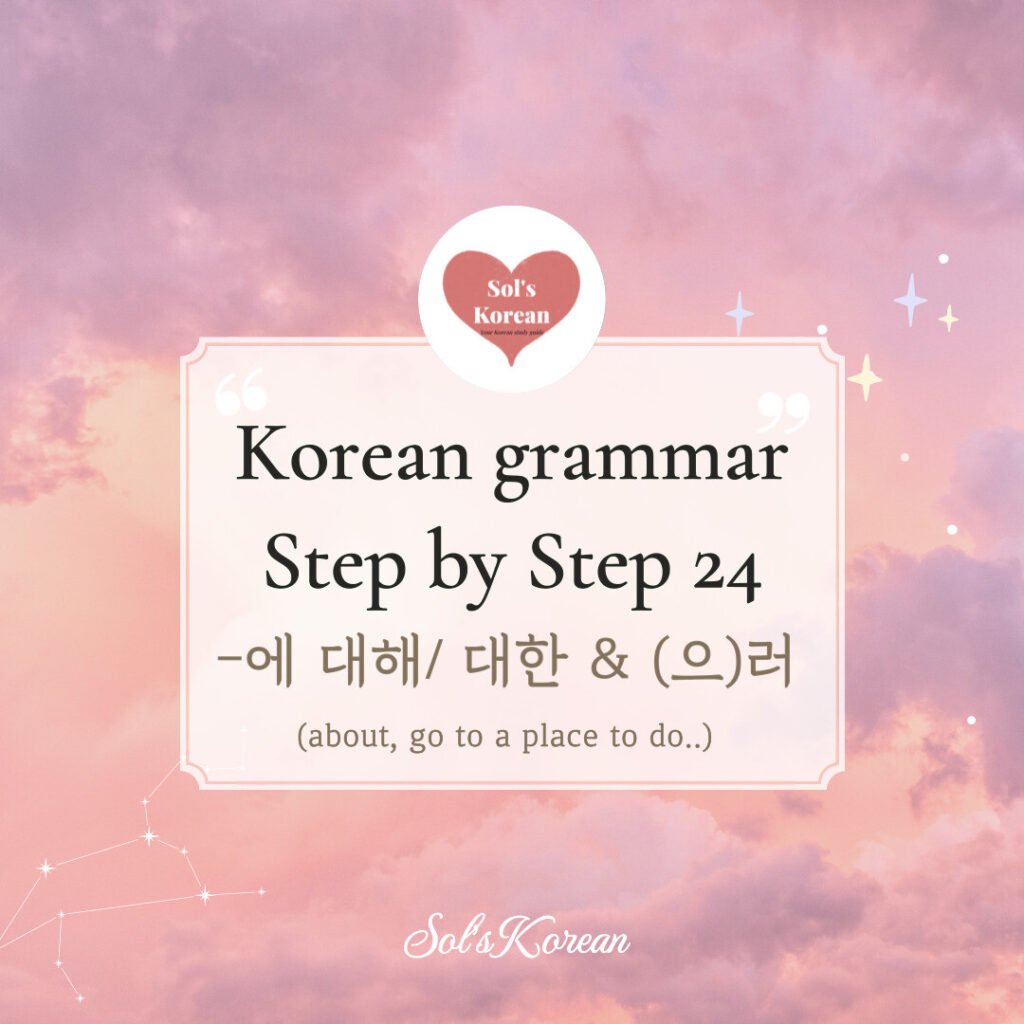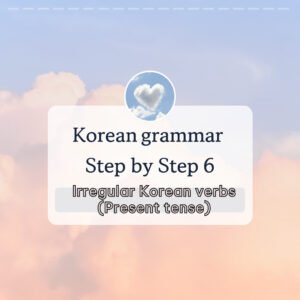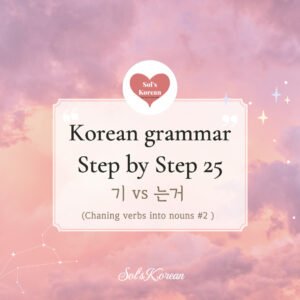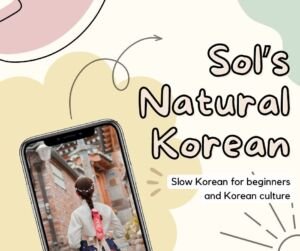으(러) & About -에 대한 / 대해 grammar
Hello, everyone!
Welcome to today’s lesson!
Today, we will delve into some prepositions, such as ‘about‘ (에 대한/대해 grammar) and the ‘(으)러‘ grammar used for going or coming to a place to do something.
We will learn some additional factors in Korean to help you create various sentences with additional information.
So, let’s dive into today’s chapter!
I will explain each point step by step to facilitate understanding.
So just follow along with me!
Part 1,
Let’s grasp the concept of grammar
About : – 에 대해(서) /대한
⭐Noun+ about⭐
When there is a noun before “after”, we will use: 에 대한 or 관한
⭐Verb+ about⭐
When there is a verb before “after, we will use: 에 대해(서) or 관해(서)
서 is often omitted!
‘-에 대해서’ and ‘-에 대한’ mean ‘about’ or ‘concerning.’
The expression ‘-에 대해서’ is followed by verbs, and ‘-에 대한’ is followed by nouns.
‘에 대해(서)’ can be replaced by ‘-에 관해(서),’ and ‘-에 대한’ can be replaced by ‘-에 관한.’
This “about” grammar is a bit different from the ones we have studied so far.
We will examine what comes before the “about” part.
Let’s look at some examples and get used to this!
Examples 😊
I read books about history.
→ 역사에 대한 책을 읽어요. / 역사에 관한 책을 읽어요.
– “About” is followed by a noun (books), so in this case, we will use “에 대한” or “에 관한.”
– ⭐We have to be careful with the order. We start with “역사(history),” then “about,” and then “books.” It’s completely the opposite! So, the correct order is “역사에 대한 책을 읽고 있어요” (history – about – books – read).
We are talking about the economy.
→ 우리는 경제에 대해 얘기하고 있어요. / 우리는 경제에 관해 얘기하고 있어요.
– “About” is followed by a verb (talk), so in this case, we will use “에 대해(서)” or “에 관해(서).”
– The general order is “subject(We) – 경제(the economy) – about – are talking.”
I hate everything about him.
→ 걔에 대한 모든 것이 싫어. / 걔에 관한 모든 것이 싫어. (casual)
– “About” is followed by a noun (everything), so in this case, we will use “에 대한” or “에 관한.”
– We start with “걔(him),” then “about,” and then “모든 것(everything).”
I thought about you.
→ 너에 대해(서) 생각했어. / 너에 관해(서) 생각했어. (casual)
– “About” is followed by a verb (thought), so in this case, we will use “에 대해(서)” or “에 관해(서).”
– We start with “너(you),” then “about,” and then “생각했어(thought).“
What’s the documentary about?
→ 뭐에 대한 다큐멘터리예요? / 뭐에 관한 다큐멘터리예요?
– “About” is followed by a noun (documentary), so in this case, we will use “에 대한” or “에 관한.”
– Be careful with the order!!. We start with “뭐” (what), then “about,” and then “the documentary,” since the verb (is, 예요) always needs to be at the end. So, the correct order is “뭐에 대한 다큐멘터리예요” (what – about – the documentary – is).
Can you grasp the concept?
The best way to get accustomed to a new grammar point is by creating sentences on your own.
Here are some exercises you can do: please don’t skip them and try them on your own!
Practice making sentences
1. We need to talk about climate change more.
(talk: 이야기하다 / climate change: 기후변화 / more: 더)
2. I don’t know much about computers; it’s not my area of expertise. (casually!)
(don’t know: 모르다/ much: 많이 / area: 분야 / expertise: 전문)
3. We all saw the news about the accident. It was horrible.
(all: 모두/ news: 뉴스 / accident: 사건 / horrible: 끔찍하다)
4. I am reading a magazine about fashion. It’s very interesting.
(magazine: 잡지 / fashion: 패션 / interesting: 흥미롭다)
5. Yesterday, I watched a movie about space, and now I want to travel to space.
(space: 우주 / movie: 영화 / travel: 여행하다)
6. Is this a novel about alien?
(this: 이거 / novel: 소설 / alien: 외계인)
7. I want to know more about you. I think I really like you. (casually!)
(know: 알다 / like: 좋아하다)
Thy these on your own first, before checking the answers!
These are the answers:
1. We need to talk about climate change more.
(talk: 이야기하다 / climate change: 기후 변화 / more: 더)
우리는 기후 변화에 대해 더 이야기 해야 해요.
◾ Before “about”, there is the verb “talk“, so we will use “-에 대해(서) or 에 관해(서)” 😁
◾ To express “need to”, we can use 해야 해요 or 해야 돼요 grammar. If you don’t remember it, please check it out here!
◾ 이야기하다 is a common verb used to mean “to talk, to chat”. It’s often shortened to 얘기하다.
◾ The order is, “We – Climate change about – need to talk”. (“More” can be placed flexibly, 이야기를 더 해야 해요 is also fine)
2. I don’t know much about computers; it’s not my area of expertise. (casually!)
(don’t know: 모르다/ much: 많이 / area: 분야 / expertise: 전문/ )
컴퓨터에 대해서 많이 몰라, 내 전문 분야가 아니야.
◾ Before “about”, there is the verb “know“, so we will use “-에 대해(서) or 에 관해(서)”! (much is an adverb)
◾ “Area of expertise” is expressed as “전문 분야” in Korean. You can memorize it as it is!
◾ The order is, “I – Computers about – much- don’t know”. 😁
3. We all saw the news about the accident. It was horrible.
(all: 모두/ news: 뉴스 / accident: 사건 / horrible: 끔찍하다)
우리 모두 그 사건에 대한 뉴스(를) 봤어요. 끔찍했어요
◾ Before “about”, there is the noun “news“, so we will use “-에 대한 or 에 관한”!
◾ “The news,” “the accident” – “the” can be expressed as “그” in Korean.
◾ The order is, “We all – the accident about – news – saw”. 😁
4. I am reading a magazine about fashion. It’s very interesting.
(magazine: 잡지 / fashion: 패션 / interesting: 흥미롭다)
패션에 대한 잡지(를) 읽고 있어요. 진짜 흥미로워요.
◾ Before “about”, there is the noun “magazine“, so we will use “-에 대한 or 에 관한”!
◾ You can say “읽는 중이에요” instead of “읽고 있어요” to express “am reading” as well!
◾ The order is, “I – fashion about – magazine – am reading”.
5. Yesterday, I watched a movie about space, and now I want to travel to space.
(space: 우주 / movie: 영화 / travel: 여행하다)
어제 우주에 관한 영화(를) 봐서, 지금 우주로 여행하고 싶어요.
◾ Before “about”, there is the noun “movie“, so we will use “-에 대한 or 에 관한”!
◾ To connect these two sentences using “and,” we can use the “아/어/해서” grammar since those two sentences are intrinsically linked. You can say *봤어서 (as past tense) as well; it’s colloquially accepted.
◾ “Now I want to travel to space.” -> You can say “우주에” instead of “우주로” as well, but here using “로” sounds more natural.
– 로: Indicates direction or route, emphasizing movement towards the destination (e.g., “우주로 여행하다” – to travel to space).
– 에: Indicates the destination or location where one arrives or stays (e.g., “우주에 있다” – to be in space).
◾ The order is, “I – space about – movie – watched”.
6. Is this a novel about alien?.
(this: 이거 / novel: 소설 / alien: 외계인)
이거(는) 외계인에 관한 소설이에요?
◾ Before “about”, there is the noun “novel“, so we will use “-에 대한 or 에 관한”!
◾ The order is, “this (subject) – alien about – novel – is?”.
7. I want to know more about you. I think I really like you. (causally!)
(know: 알다 / like: 좋아하다)
너에 대해 더 알고 싶어. 나 너를 진짜 좋아하는 것 같아.
◾ Before “about”, there is the verb “know“, so we will use “-에 대해(서) or 에 관해(서)”! (more is an adverb, it’s used to emphasize!)
◾ To express “I think,” we can use the -것 같아 grammar. If you don’t remember it, please check it out here!
◾ The order is, “I – you about – want to know”. (“More” can be placed flexibly, 더 너에 대해 알고 싶어 is also fine)
Great job! Understanding “about” grammar can be a bit tricky, but the best way to get used to it is by listening to native speakers and exposing yourself to various Korean media. I’ll make sure to revisit this concept regularly during our practice sessions to reinforce your learning!
Let’s learn one more grammar point that’s very similar to the previous one we covered, (으)려고. It conveys a similar concept but involves a slight change in form depending on the verbs.
“to, in order to”: ~ (으)러
Do you remember? The (으)려고 grammar pattern is used to express intention or purpose, similar to “in order to” or “with the intention of” in English. When using verbs related to “go” or “come” to describe the purpose of going to a place, we use (으)러 instead of (으)려고. Simply drop the “고” and adjust the pronunciation from “려” to “러.”
⭐How to form it⭐
When a verb ends in a vowel: 러
When a verb ends in a batchim: 으러
Verbs ending in “ㄹ” batchim is an exception, we add “러” directly!
Take a look at the examples to understand the concept better!
Examples 😊
I go to meet my friend: 친구(를) 만나러 가요.
→ To express the purpose of an action with “to,” you can use (으)려고. But wait! When the verb is “to go,” we switch from (으)려고 to (으)러. Here, since the verb “만나다” (to meet) ends in a vowel, we simply add -러.
I came to read a book : 책(을) 읽으러 왔어요.
→ To express the purpose of an action with “to,” you can use (으)려고. But wait! When the verb is “to come,” we switch from (으)려고 to (으)러. Here, since the verb “읽다” (to read) ends in a batchim, we simply add –으러.
I came back to Korea to live : 한국에 살러 돌아 왔어요.
→ To express the purpose of an action with “to,” and the verb is “to come back,” we switch from (으)려고 to (으)러. Here, since the verb “살다” (to read) ends in ㄹ, we simply add -러.
A bit more Examples 😊
차 수리하러 차 센터에 갔어요.
I went to the car repair center to repair my car.
*수리하다 (to repair) + 러(to) → 수리하러 (Since 수리하다 ends in a vowel, we add 러.)
* The verb is “가다(to go)”, We will use (으)러 instead of (으)려고.
한국어 수업 들으러 학교에 걸어 가요.
I walk to school to take a Korean language class.
* 듣다 (to listen) + 으러(to) → 들으러 (듣다 is an irregular verb, it conjugates to 들어요. and then we’ll add 으러.) When 듣다 is used with “class(수업)”, it means “to take class”.
* The verb involves “가다(to go)”, We will use (으)러 instead of (으)려고.
인터뷰하러 왔어요.
I came to do an interview.
* 인터뷰하다 (to interview) + 러(to) → 인터뷰하러 (Since 인터뷰하다 ends in a vowel, we simply add 러.)
* The verb is “오다(to come)”, We will use (으)러 instead of (으)려고.
식당에 밥 먹으러 뛰어 가요.
I run to the restaurant to eat.
* 밥 먹다 (to eat) + 으러(to) → 밥 먹으러 (Since 먹다 ends in a batchim, we add 으러.)
* The verb involves “가다(to go)”, We will use (으)러 instead of (으)려고.
Now, let’s practice using these grammar rules in real sentences. !😊
1. I usually go to a library to study every day.
( library: 도서관 / every day: 매일)
2. It’s already too late, so I’m going to bed first. (= I’m going to go to sleep)
(already: 이미 / too : 너무 / be late: 늦다 / first: 먼저)
3. I came to Korea to travel with my family for a month.
(travel: 여행하다 / family: 가족 / a month: 한달)
4. The weather is nice, let’s go for a walk! (go to take a walk) (casually!)
(weather: 날씨 / take a walk: 산책하다 )
5. I want to go out to watch a movie tonight.
(tonight: 오늘밤 / movie: 영화 / to go out: 나가다)
6. I came here for an interview. (to do an interview)
(here: 여기 / do an interview: 인터뷰(를) 하다)
7. It’s the weekend, should we go out to eat something delicious?
(weekend: 주말 / go out: 나가다)
Thy these on your own first, before checking the answers!
These are the answers:
1. I go to a library to study every day.
(library: 도서관 / every day: 매일)
매일 도서관에 공부하러 가요.
■ When we go to a place to do something, we use the verb “가다” with the (으)러 grammar pattern to express the purpose of going. For example, if we “go to a library to study,” we can say 공부하러. Since 공부하다 ends in a vowel, we simply add -러, making it 공부하러.
■ The general sentence order in Korean is subject – time – location – other details (from broader to more specific). However, this order can change depending on what you want to emphasize.
■ Lastly, remember that we don’t use “에” after 매일 (every day) when expressing time.
2. It’s already too late, so I’m going to bed first. (= I’m going to go to sleep) (casually!)
(already: 이미 / too : 너무 / be late: 늦다 / first: 먼저)
이미 너무 늦어서, 먼저 자러 갈게.
■ Here, we go to “sleep”, we use the verb “가다” with the (으)러 grammar pattern to express the purpose of going. We “go to sleep,” we can say 자러. Since 자다 ends in a vowel, we simply add -러, making it 자러.
■ You can say 자러 갈 거예요 to express the future tense, but when responding or talking directly to someone, 자러 갈게요 sounds more natural.
■ To connect sentences and express “so” or “because,” you can use the -아/어/해서 form.
3. I came to Korea to travel with my family for a month.
(travel: 여행하다 / family: 가족 / a month: 한달)
한달동안 가족이랑 한국에 여행하러 왔어요.
■ Here, we “came” to “travel”, we use the verb “오다(to come)” with the (으)러 grammar pattern to express the purpose of coming. We “came to travel,” we can say 여행하러. Since 여행하다 ends in a vowel, we simply add -러, making it 여행하러.
■ You can change the order of 한달동안, 가족이랑, and 한국에! It doesn’t make a big difference, as long as the main verb stays at the end.
4. The weather is nice, let’s go for a walk! (go to take a walk).
(weather: 날씨 / take a walk: 산책하다 )
날씨 좋은데, 산책하러 가자!
■ Here, we go to “take a walk”, we use the verb “가다” with the (으)러 grammar pattern to express the purpose of going. We “go to take a walk(for a walk),” we can say 산책하러. Since 산책하다 ends in a vowel, we simply add -러, making it 산책하러.
■ I use the 는데 grammar to connect two sentences, providing background information followed by a suggestion. If you don’t remember this concept well, you can check it out here!
■ To express “let’s,” we can use the 자 ending.
“Let’s go eat”: 밥 먹으러 가자.
“Let’s go watch a movie”: 영화 보러 가자.
5. I want to go out to watch a movie tonight.
(tonight: 오늘밤 / movie: 영화 / to go out: 나가다)
오늘밤에 영화(를) 보러 나가고 싶어요.
■ Here, we go out to “watch”, we use the verb “나가다(to go out)” with the (으)러 grammar pattern to express the purpose of going out. We “go out to watch,” we can say 보러. Since 보다 ends in a vowel, we simply add -러, making it 보러.
6. I came here for an interview. (to do an interview)
(here: 여기 / do an interview: 인터뷰(를) 하다)
여기(에) 인터뷰 하러 왔어요.
■ Here, we “came” to “do an interview”, we use the verb “오다(to come)” with the (으)러 grammar pattern to express the purpose of coming. We “came to do an interview,” we can say 인터뷰하러. Since 인터뷰 하다 ends in a vowel, we simply add -러, making it 인터뷰 하러.
7. It’s the weekend, should we go out to eat something delicious?
(weekend: 주말 / go out: 나가다)
주말인데, 우리 맛있는 거 먹으러 나갈까?
■ Here, we go out to “eat”, we use the verb “나가다(to go out)” with the (으)러 grammar pattern to express the purpose of going out. We “go out to eat,” we can say 먹으러. Since 먹다 ends in a batchim, we simply add -으러, making it 먹으러.
■ I use the 는데 grammar to connect two sentences, providing background information followed by a suggestion!
■ I can use the 는 거 grammar to express ‘something delicious.’ If you don’t know how to use it yet, please check it out here!
Great job!
You’ve been doing an excellent job—keep up the good work!

To book a lesson with me, click here!
To improve your listening skills, check it out here!
Come visit my Youtube channel as well!




